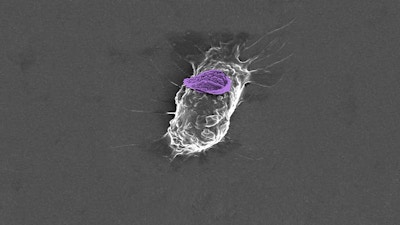- Cancer
- Autoimmune diseases
- Vaccines
- Tissue regeneration
- Diagnostics

Cellular “Backpacks” to Fight Cancer, Autoimmune Disorders, and More
Cell therapy innovation enables fine-tuned control over macrophages and other immune cell types
Want to license this technology?
To obtain additional information or to learn more about our intellectual property portfolio or licensing opportunities, please contact us.
Bioinspired Therapeutics & Diagnostics
Want to license this technology?
To obtain additional information or to learn more about our intellectual property portfolio or licensing opportunities, please contact us.

The Problem
Macrophages are the body’s multipurpose defense agents, patrolling for pathogens and engulfing cellular debris, foreign substances, microbes, and even cancer cells. But cancerous tumors have evolved an insidious defense mechanism: they can switch arriving macrophages from an active, pro-inflammatory state to a passive, anti-inflammatory state, in which they actually promote the tumor’s growth. The inverse can also occur, in which passive macrophages arriving at a site of inflammation are activated and promote more inflammation, exacerbating the problem. As a result, attempts to use macrophages as a cell therapy against cancer and other diseases have largely failed.
Our Solution
Scientists at the Wyss Institute have found a solution through the creation of cellular “backpacks” for macrophages: disc-shaped nanoparticles that can stick to a macrophage without being engulfed, and release a steady stream of cytokines into their macrophage “hosts” to keep them activated. When macrophages were incubated with backpacks in vitro and then injected into mice with lung cancer, they induced tumor-promoting macrophages in the animals’ tumors to revert back to an anti-cancer state, causing the tumors to shrink and increasing overall survival.
Cellular backpacks have also been successfully used to enable the non-invasive diagnosis of “silent” mild traumatic brain injuries (TBIs) and reduce the size of TBI lesions in pig models.
The physical properties and payloads of the backpacks can be tuned to enable them to attach to and influence the function of numerous cell types, improving the efficacy of cell therapies. Notably, cellular backpacks have been attached to myeloid cells to reverse the effects of multiple sclerosis (MS) in mice.
Drug Target Review covered a February 2024 publication, highlighting how researchers at the Wyss Institute and Harvard SEAS used these backpacks to advance neutrophil therapies. Neutrophils have been used for over 40 years to support the immune systems of cancer patients receiving chemotherapy, yet utilising neutrophils to directly target the cancer itself is a novel approach.
Various applications of this technology are available for licensing.
Want to license this technology?
To obtain additional information or to learn more about our intellectual property portfolio or licensing opportunities, please contact us.